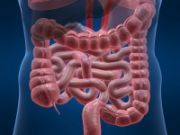Article
Promising Initial Results from Novel Treatment for Ulcerative Colitis
Author(s):
Phase 2 study results show patients with ulcerative colitis treated with an investigational oral compound achieved higher rates of remission, reduced rectal bleeding, and increased mucosal healing compared to patients who received placebo.

Selective inhibition of lymphocyte trafficking has been a promising treatment for ulcerative colitis, but most drug candidates being research are monoclonal antibodies.
Now, an investigational drug with the code name AJM300, an orally active, small molecule α4 integrin antagonist, has been shown to inhibit the binding of α4β1/α4β7 integrin-expressing cells to VCAM-1/MAdCAM-1, and has been evaluated in patients with moderately active ulcerative colitis.
This approach was discussed at Digestive Disease Week 2014 in Chicago, IL, during a joint presidential plenary session moderated by Kenneth Wang, MD, president of the American Society for Gastrointestinal Endoscopy, and Anil K. Rustgi, MD, president of the American Gastroenterological Association Institute. The session highlighted some of the most innovative current research in gastroenterology and GI endoscopy.
Mamoru Watanabe, MD, PhD, from the Tokyo Medical and Dental University, presented the AJM300 results. He said, “The proportion of patients achieving greater response was significantly higher in the treatment group than in the placebo group. In addition, a higher proportion of patients with clinical remission… and histological improvement were also observed in the AJM300 group.”
Researchers evaluated the efficacy and safety of AJM300 in 102 Japanese patients with ulcerative colitis. The patients had:
- A Mayo Clinic score from 6 to 10
- An endoscopic subscore ≥2
- A rectal bleeding subscore ≥1
- An inadequate response or intolerance to 5-ASA or corticoids
In this double-blind, multicenter, placebo-controlled phase 2a study patients were randomly assigned to receive 960 mg of AJM300 or placebo three times a day for 8 weeks.
The primary goal was to reduce the Mayo Clinic score by at least three points and achieve a 30% decrease from baseline by week eight, and to decrease the rectal bleeding subscore by at least one point or achieve an absolute rectal bleeding subscore of 0 to 1.
The investigators reported that 62.7% of patients in the AJM300 group achieved those results vs. 25.5% in the placebo group (odds ratio [OR], 5.35; 95% confidence interval [CI], 2.23 to 12.82; p=0.0002).
Nearly one in four participants in the AJM300 arm (23.5%) also achieved the secondary endpoint of clinical remission at 8 weeks, compared to only 3.9% of the placebo group (OR, 7.81; 95% CI, 1.64 to 37.24; P=0.0099).
Mucosal healing was better in the AJM300 group at week 8 than in the placebo group‑‑58.8% vs. 29.4% (OR, 4.65; 95% CI, 1.81 to 11.90; P=0.0014).
Results were achieved without serious adverse effects or infection. The investigators said these findings indicate that this therapy may give patients alternatives to biologics in improving quality of life.
“AJM300 may be of benefit to patients with IBD (inflammatory bowel disease) as a novel oral therapeutic option,” said Watanabe.
Oral drug formulations may also solve some of the problems associated with biologics, including their substantial cost, he said.





